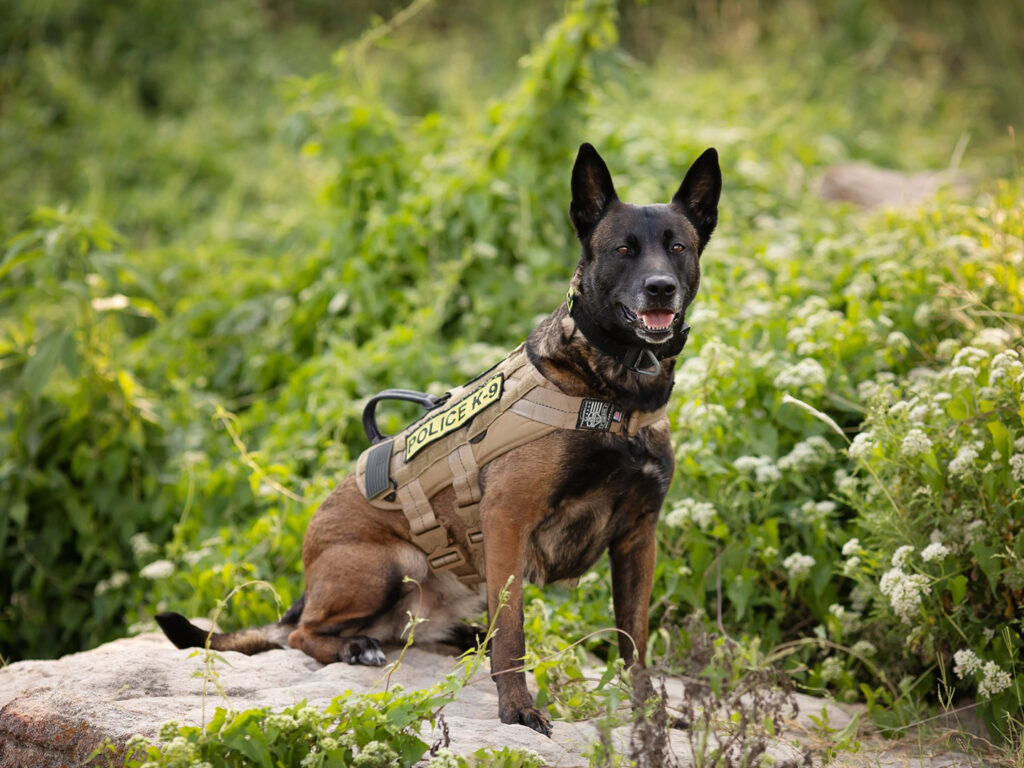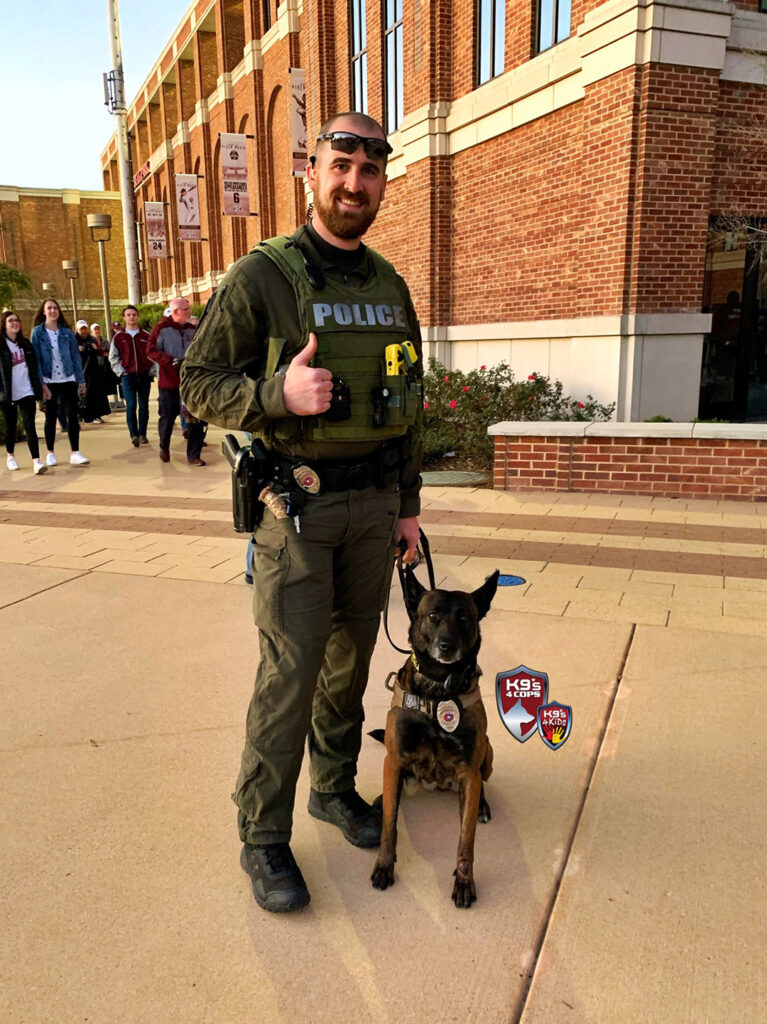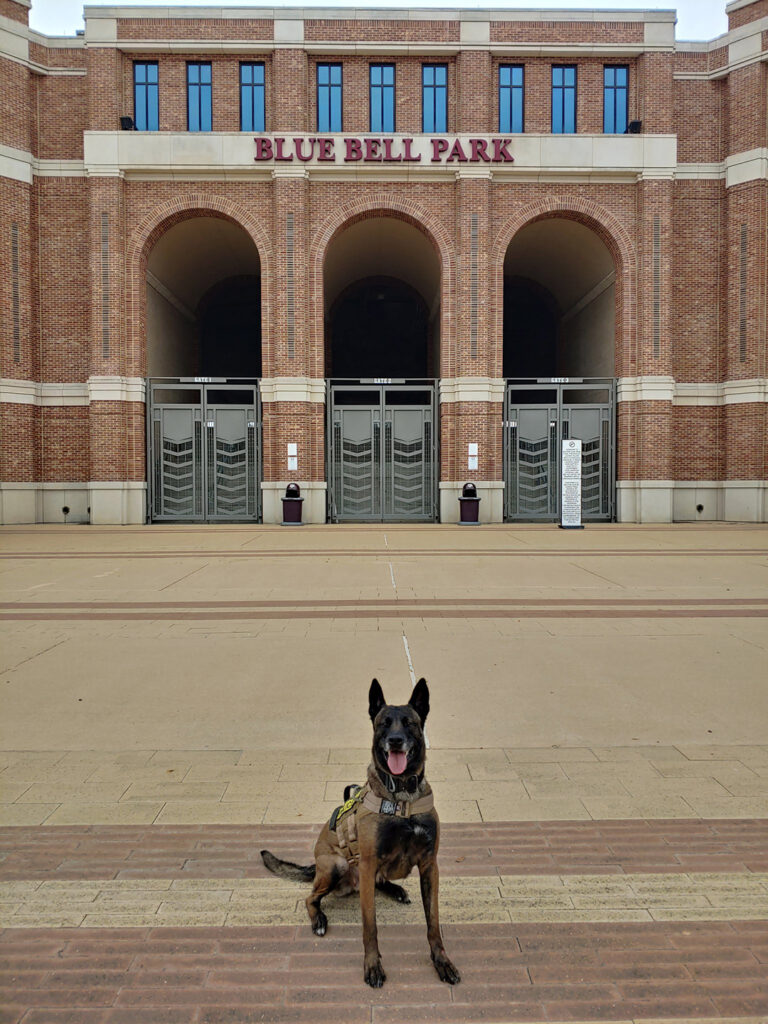Texas A&M Veterinarians Help Beloved Campus Police K-9 BTHO Mammary Cancer
Story by Courtney Price, VMBS Communications

Photo courtesy of the Texas A&M University Police Department
When one of Texas A&M University’s police K-9s was diagnosed with cancer, veterinarians at the Texas A&M Veterinary Medical Teaching Hospital (VMTH) had the opportunity to serve an animal just as hardworking as they are.
Jackie is a 9-year-old Belgian Malinois who worked alongside the Texas A&M Police Department as an explosives detection K-9 until her retirement earlier this year.
“Jackie has an incredible work ethic,” said Officer John Browning, Jackie’s owner and former handler. “Numerous handlers, trainers, and judges have described her as a once-in-a-career dog. She absolutely loved to work and was very good at her job.”
In February, Jackie was diagnosed with mammary cancer — called breast cancer when it occurs in humans — and was taken to the Small Animal Teaching Hospital for surgery to remove the tumors.
Thanks to the efforts of her care team, Jackie’s cancer was detected in the early stages, leading to its complete removal.
A Surprise Diagnosis
All university K-9s receive medical care at the VMTH in order to make sure that they are healthy and able to do their jobs. It was during one of Jackie’s routine check-ups that her care team detected small nodules in her mammary glands, which can feel like small, hard beads under an animal’s fur.
“She had a couple of tumors on her left side that were each about two centimeters wide,” said Dr. Shelby Gasson, a third-year surgery resident. “She also had a few on the right side that were smaller, about one centimeter wide each.

Photo courtesy of the Texas A&M University Police Department
“Most of Jackie’s tumors ended up being benign, which is common for mammary tumors in dogs, but one of them was a low-grade adenocarcinoma, which means it was cancerous,” she said. “Thankfully, we were able to completely remove that tumor.”
While, in general, it’s important for female dogs to be spayed early in life to prevent them from developing mammary cancer later on, working dogs like K-9s often need to remain intact.
“Females that are not spayed before their first heat are several times more likely to develop mammary masses and cancers later in life,” Gasson said. “However, spaying working dogs is not always an option, since it can affect the animal’s behavior and muscle tone, which are important to its ability to perform its duties.
“For working dogs that are intact, it’s very important to take them to regular check-ups so veterinarians can keep a lookout for things like cancer, uterine infections, and some of the other health issues that non-spayed and non-neutered dogs can develop,” Gasson said.
Keeping Campus Safe
It takes a lot of people — and even a few animals — to keep a large campus like Texas A&M safe. More than 70,000 students attend the main campus in College Station, which is also home to more than 3,500 faculty and around 8,000 staff members.
“We currently have 160 authorized positions, including 78 state-certified police officers,” Browning said. “We also have three K-9s who help us with explosive detection and tracking.”
As a university police K-9, Jackie often helped with explosives detection at Texas A&M’s Kyle Field, something she was bred and trained to be very good at; it’s no simple matter to protect the tens of thousands of people — including fans, players, and staff — who are present on home game days.
“Jackie was donated to our department by an organization called K9s4Cops, and her initial training lasted about nine weeks,” Browning said. “She continued to get training throughout her career, both for formal certifications and to keep her skills sharp. I tried to do some kind of training with her every day.”

Photo courtesy of the Texas A&M University Police Department
Even though K-9s are hard-working animals, Jackie was always a shining star amidst her peers.
“Jackie’s specialty was called ‘mobile odor detection,’ which means that she would track the scent through a crowd back to a specific person,” Browning said. “This is the opposite of static detection, where the target or device doesn’t move.”
Jackie’s nose is so effective that she once tracked down an off-duty police officer attending a baseball game just by the lingering smell of his handgun, which he did not have with him at the time.
Taking A Bow
Although Jackie’s surgery to remove the cancer was successful, she was close enough to retirement age that her care team recommended she end her service to the university early.
“She is enjoying retirement and does not appear to miss going to work at all,” Browning said. “The first time I returned to work with my new K-9, Taps, I fully expected Jackie to see my uniform and get excited about going to work. But she just walked right past me and hopped up on the bed to sleep without a care in the world.”
Browning also said he’s happy that he gets to continue spending lots of time with his good friend.
“I still give her ‘problems’ to solve at home to keep her mentally stimulated,” he said. “But she loves that she gets to be lazy and hang out with my wife and kids all day.”
###
For more information about the Texas A&M College of Veterinary Medicine & Biomedical Sciences, please visit our website at vetmed.tamu.edu or join us on Facebook, Instagram, and Twitter.
Contact Information: Jennifer Gauntt, Director of VMBS Communications, Texas A&M College of Veterinary Medicine & Biomedical Sciences, jgauntt@cvm.tamu.edu, 979-862-4216


